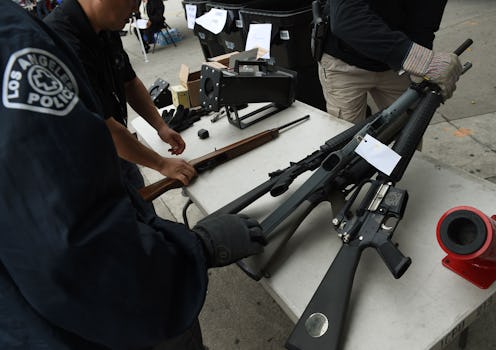News
Here's What California's Gun Laws Are
After a shooting on the campus of the University of California, Los Angeles caused a school-wide lockdown and a citywide tactical alert, police responded to the scene, where at least two men died, one of whom was perhaps the gunman. And like every other time we see an incident like this (because it happense way, way too often), the question of gun laws arises. So what are California's gun laws? They're actually quite stricter than in most other states, especially thanks to some recent legislation.
According to the California Firearms Laws Summary report, there are several laws that require a lot of work to obtain a firearm. To buy a gun, one must present documentation that they are a California resident, obtain a Firearm Safety Certificate by scoring at least 75 percent on a written test, perform a safe handling demonstration with the gun that they want to purchase, and wait for 10 days while a background check is performed.
To pass a background check, a person 1) cannot have been convicted of a felony, 2) cannot have been convicted of a violent firearm offense, 3) cannot have been convicted twice of displaying a firearm in a threatening manner or using a firearm during a quarrel, 4) cannot be adjudicated to be a mentally disordered sex offender, and 5) cannot have been found by a court to be mentally incompetent to stand trial or not guilty by reason of insanity of any crime.
As the NRA succinctly put it in a handy chart, California requires a permit to purchase rifles, shotguns, and handguns, requires registration of those same firearms, and requires a permit to carry a handgun, though no permit is required to carry a rifle or shotgun.
There are even more rules and regulations. You can't buy more than one handgun every 30 days. Any gun you buy has to be equipped with a Firearm Safety Device. If you move to California from another state and bring your guns with you, you have to register those guns with the state within 60 days. You must have a license if you want to concealed carry, but you can't do that at schools (including colleges). And there's definitely no open carrying, like you're allowed to do in Texas.
Anti-gun-control advocates might be quick to claim that strict gun laws don't protect us from school shootings like the one that happened at UCLA on Wednesday, but as The Los Angeles Times' editorial board pointed out, a bigger issue that needs to be tackled along with gun control is the culture of gun violence that is so rooted in America. In its piece, "California's proposed gun laws won't change our culture of violence, but they will make us safer," the Board argues just that. Even though gun control changes are small, they can at least close some loopholes that allow more shootings — like the more recent one at UCLA — to happen.
